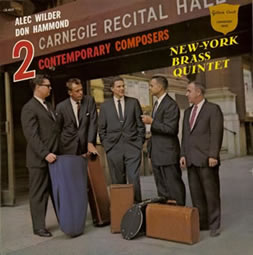TranscriptionsHarvey Phillips has been a very smart man for a very long time.
There was a small controversy at the Eastman school at that time regarding the correctness and acceptability of performing transcriptions. There was the unofficial doctrine of Eastman, which held that transcriptions were in poor taste and simply shouldn’t be done, and there was a much smaller school of thought, which maintained that transcriptions were acceptable as long as they worked and they sounded good. In Amsterdam in the 60’s it was even more rigid; one simply could not play transcriptions in Holland during that period. I, being a good Eastman student choose to obediently and comfortably follow the school’s view but with the New York Brass Quintet in town playing superb performances of some of their excellent transcriptions, these conservative views that dominated the thinking in Eastman were hard to sustain. That afternoon the New York Brass Quintet gave an unforgettable master class. Among the abundance of mind expanding thoughts that were heard that day came the question regarding the acceptability of transcriptions. Harvey Phillips immediately stood up and offered his answer; I can’t remember his exact words but it was something very close to the following, directly after an extraordinary performance of a Bach contrapuntus: “If those who would like to forbid us the performance of transcriptions are going to have their way, then they should go all the way; They should insist that music never be played in any setting other than how the composer intended it, they should insist music be played only on the instruments that existed during the period the composer wrote it and further, just to be sure, they should insist music be played only by the musicians who were alive in that period!” The normally conservative Eastman audience broke in to a spontaneous explosion of applause and cheers. Personally, those words opened up a whole new world to me; a fresh new path. In all honesty I have to tell a small coda to this story. Many years later I remember having a conversation with Harvey where he was advocating the playing transcriptions of symphony orchestra with band, both because it sounded good and that it also would give band players the experience of playing works they otherwise may never get the chance to play. I argued the point, saying that was going too far. Now that I am a conductor of a wind ensemble in a Japanese conservatory, I realize how short sighted I was then and how right Harvey was. Still, we shouldn’t stop discussing the question. I have a question I’ve been posing to my master class audiences for the last 25 years. Imagine you are in a concert hall and you are about to hear the best horn player in the world perform the Adagio and Allegro by Schumann. This is not one of the great horn players you could name but it is the best horn player in the world that exists in your sonic imagination; close your eyes and listen in your mind to this great horn player... Now do the same thing but with a cellist. (The Schumann Adagio and Allegro for horn has been transcribed for many instruments including cello and it has been performed and recorded by the greatest cello players.) But like the hornist, this cellist in not one of the famous cellists in the world, it is the greatest cellist in the world that exists in your imagination. Close your eyes and listen. Now do the experiment with tuba; close your eyes and listen. Now ask yourself the following questions: Which did I like the best, horn, cello or tuba? Why? If you choose cello do you believe the tuba has the capabilities of sounding equally beautiful? This survey, which I’ve taken all over the world for 25 years, invariably results in favor of cello by about 85%, even when the audience is exclusively brass players! This is not a bad thing; it means that the brass playing community is a realistic and musically discriminating group. It means that “best in the world” horn player, cellist or tubist is very high quality indeed which means that in all of us, in our musical imaginations can create excellence. How to realize that excellence while playing our chosen instrument is the challenge all of us face!
Fortunately, the old prejudices regarding transcriptions are all but gone and we are free to play what pleases us and what sounds good; if you are not a composer try making some transcriptions and enjoy opening new repertoire for our instrument. |


 In the late 50’s while I was an undergraduate at the Eastman School
of Music, the New York Brass Quintet came to Rochester and presented a master
class and concert I will never forget. This was a time when the members of
the Canadian Brass Quintet were still children or weren’t even born,
and the New York Brass Quintet was the first such group to make a success of
concertizing; as I recall I was 20, and it was still a time when dreams and
heroes were strategic to my motivation. What a quintet they were, they played
the Bozza Quintet like I never imagined possible and, as I remember it, they
played the world premier of the Malcolm Arnold Quintet which I thought was
the most exciting brass piece I had ever heard.
In the late 50’s while I was an undergraduate at the Eastman School
of Music, the New York Brass Quintet came to Rochester and presented a master
class and concert I will never forget. This was a time when the members of
the Canadian Brass Quintet were still children or weren’t even born,
and the New York Brass Quintet was the first such group to make a success of
concertizing; as I recall I was 20, and it was still a time when dreams and
heroes were strategic to my motivation. What a quintet they were, they played
the Bozza Quintet like I never imagined possible and, as I remember it, they
played the world premier of the Malcolm Arnold Quintet which I thought was
the most exciting brass piece I had ever heard.